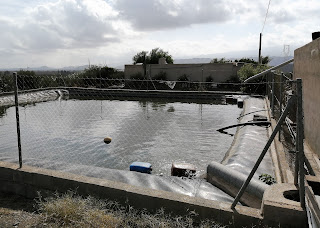Over the
years, I have visited many parts of Spain. I've studied in Seville,
lived in Madrid, spent long hospital time with my late wife in Pamplona
and, during the nineties, run offices in various pueblos on the costas,
which necessitated regular visits (and a lot of aspirins). There was
also an office in Mojácar, the town that I have called 'home' for most
of my life. I know the province of Almería pretty well, with the last
few years spent living just outside the capital, and, of course, I've
made endless trips to various towns and villages over the past fifty
years.
But, until now, I had never been to Adra.
This hardly makes me unique. No one has ever been to Adra.
Adra, at 25,000 inhabitants, is the large fishing port that signals the
end of Almería when heading along the Mediterranean west into Granada
and Málaga. In the old days, it was a turn-off from another switch-back
curve on the ghastly road between Almería and Málaga (there were 1,060
of those horrible switch-backs, as the old N340 curved and wiggled
through the sharp hills above the coast-line), but now the fishing town
of Adra is close to the bright new motorway. There is still little
inclination to visit the place, which, as I finally discovered this
weekend, is a shame.
According to Wiki (we couldn't find a tourist office), Adra is
the fourth oldest town in Spain, founded in 1520BC. Let see... it was
originally called Abdera by the Carthaginians, was flattened by an
earthquake in 881, yadda yadda, it had the first steam engine in Spain and is a big fishing port...
Yep, the man from the Wiki clearly hasn't visited the place either. Confusingly, Google
gives more space to another Adra, which is an agency of the Seventh-day
Adventist Church (and may help to explain why no one ever visits).
Anyhow; in the spirit of 'because it's there'. I went with my pareja
to give the car a good growl, see the sights, buy a 'He who is tired of
Adra is tired of Life' bumper sticker, and hopefully enjoy a good fishy
lunch. The road to Adra, designed apparently by more of the school of
those who only know the town through its motto: 'En Adra, perro que no muerde, ladra'
(the dog that doesn't bite you, barks at you instead), swings you in
through and out in a confusing swirl, but then, as your heart sinks and
you wonder whether the next town down, Motril, might be open for
business, the planners relent and bring you back down to the harbour.
 That
day, there was by chance a flea market. We walked around, admiring a
stand selling Franco memorabilia, and eventually, while looking for a
bullfight poster for a friend, we bought a couple of naïf pictures from
another dealer. They look great in our kitchen.
That
day, there was by chance a flea market. We walked around, admiring a
stand selling Franco memorabilia, and eventually, while looking for a
bullfight poster for a friend, we bought a couple of naïf pictures from
another dealer. They look great in our kitchen.
Adra appears to be a place that is worth getting to know, or maybe a
great place to hide, as nobody would ever think of looking for you
there. It's probably chock-full of museums and interesting relics and
buildings, plus a few wanted counterfeiters and smugglers (the murderers
prefer Marbella, obviously), but we were there principally for a cold
beer and a warm fish-head.
Alicia didn't want to eat in the Club Náutico (you can never go wrong in
a Club Náutico in my opinion) so we walked past some dowdy looking
places, including a joint that described itself from outside as
'American/Italian', before alighting on the Taberna La Granja,
a splendid and atmospheric bar/restaurant in a back street. We ate a
satisfyingly expensive lunch there, served by the owner himself
(intrigfued, no doubt, in meeting the first visitors to the town in
decades) and returned, replete, to the car.
La Granja - and you are on your own here - has a great Tarta de Whisky. The owner pours half a bottle of scotch over it to make sure that it meets with the diner's approval.
Worked for me, although I may have got a speeding ticket while we were driving home...
